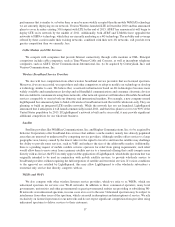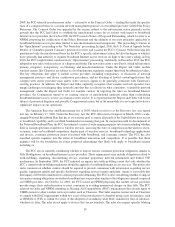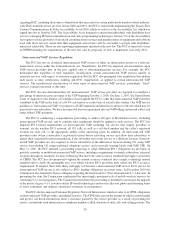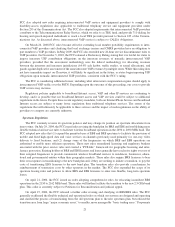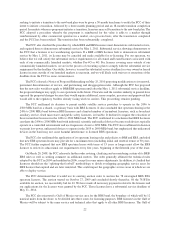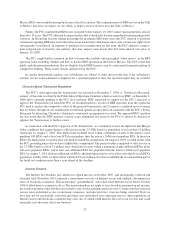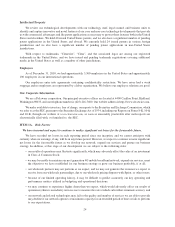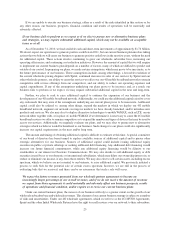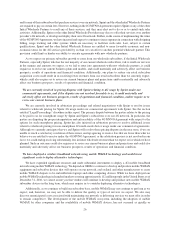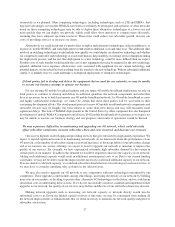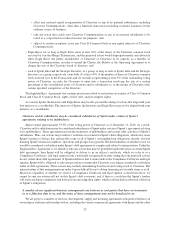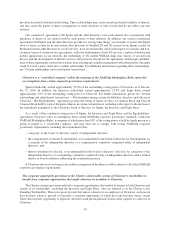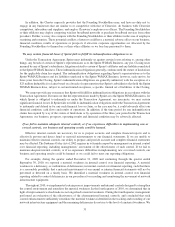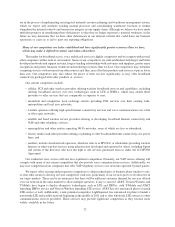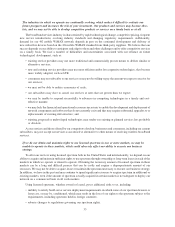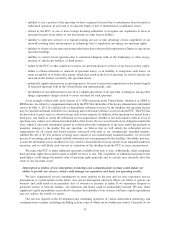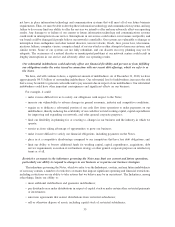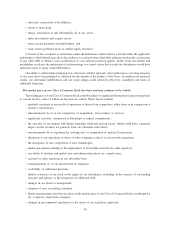Clearwire 2010 Annual Report Download - page 31
Download and view the complete annual report
Please find page 31 of the 2010 Clearwire annual report below. You can navigate through the pages in the report by either clicking on the pages listed below, or by using the keyword search tool below to find specific information within the annual report.and for any of their subscribers that purchase services over our network, Sprint and the other Initial Wholesale Partners
are required to pay us certain fees. However, nothing in the 4G MVNO Agreement requires Sprint or any of the other
Initial Wholesale Partners to resell any of these services, and they may elect not to do so or to curtail such sales
activities. Additionally, Sprint or the other Initial Wholesale Providers may elect to offer their services over another
provider’s 4G network, or develop and deploy their own 4G network. Further, in the course of implementing the terms
of the 4G MVNO Agreement, we have incurred and expect to continue to incur expenses in connection with designing
billing, usage tracking and other systems which are necessary to facilitate such sales. Last, subject to certain
qualifications, Sprint and the other Initial Wholesale Partners are entitled to more favorable economic and non-
economic terms for the 4G services provided by us than we can offer to another potential wholesale partner. This
provision could limit or hinder our ability to execute agreements with new wholesale partners.
As we expect our primary subscriber growth to come from our wholesale subscribers, if the Initial Wholesale
Partners, especially Sprint, who has the vast majority of our current wholesale subscribers, fail to resell our services
in the manner and amounts we expect, or we fail to enter into agreements with new wholesale partners, it could
require us to revise our current business plans and models, and could materially and adversely affect our business
prospects, results of operations and financial condition. Additionally, our plans to reduce our retail subscriber
acquisition costs could result in us receiving fewer revenues from our retail subscribers than we currently expect,
which could also require us to revise our current business plans and projections and/or materially and adversely
affect our business prospects, results of operation and financial condition.
We are currently involved in pricing disputes with Sprint relating to 4G usage by Sprint under our
commercial agreements, and if the disputes are not resolved favorably to us, it could materially and
adversely affect our business prospects, results of operations and financial condition, and/or require us to
revise our current business plans.
We are currently involved in arbitration proceedings and related negotiations with Sprint to resolve issues
related to wholesale pricing for Sprint 4G usage under our commercial agreements with Sprint. See the section
entitled “Legal Proceedings” elsewhere in this report. The primary dispute between the parties relates to the pricing
to be paid to us for smartphone usage by Sprint and Sprint’s subscribers over our 4G network. In particular, the
parties are disputing the proper interpretation and enforceability of the 4G MVNO Agreement with respect to the
options for such smartphone pricing. Sprint has also initiated an arbitration process to resolve additional issues
related to wholesale pricing for non-smartphone 4G multi-mode device usage under our commercial agreements.
Although we currently anticipate that we and Sprint will resolve these pricing disputes in the near term, if we are
unable to reach a satisfactory resolution of these issues, end up agreeing to receive fees that are lower than what we
believe we are entitled to receive under the 4G MVNO Agreement, or the arbitration process is not resolved in our
favor, we could end up receiving substantially less in future wholesale revenues than we expect or for which we have
planned. Such an outcome could also require us to revise our current business plans and projections and could also
materially and adversely affect our business prospects, results of operations and financial condition.
We have deployed a wireless broadband network using mobile WiMAX technology and would incur
significant costs to deploy alternative technologies.
We have expended significant resources and made substantial investments to deploy a 4G mobile broadband
network using mobile WiMAX technology. We depend on OEMs to continue to develop and produce mobile WiMAX
equipment and subscriber devices that will operate on our network, and on Intel and other manufacturers to cause
mobile WiMAX chipsets to be embedded into laptops and other computing devices. While we have deployed our
mobile WiMAX technology in launched markets covering approximately 112 million people in the United States as of
December 31, 2010, we cannot assure you that vendors will continue to develop and produce new mobile WiMAX
subscriber devices in the long term, which may require us to consider deploying alternative technologies.
Additionally, as we continue to build our subscriber base, mobile WiMAX may not continue to perform as we
expect, and, therefore, we may not be able to deliver the quality or types of services we expect. We also may
discover unanticipated costs associated with maintaining our network or delivering services we must offer in order
to remain competitive. The development of the mobile WiMAX ecosystem, including the adoption of mobile
WiMAX by other companies and the availability of mobile WiMAX devices, has not occurred as quickly or
26



